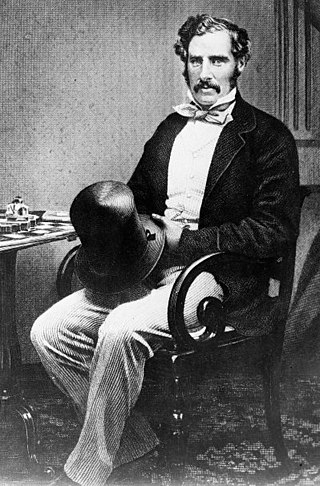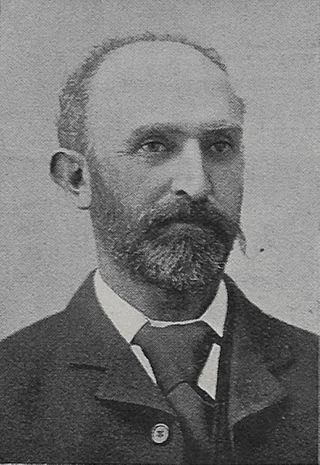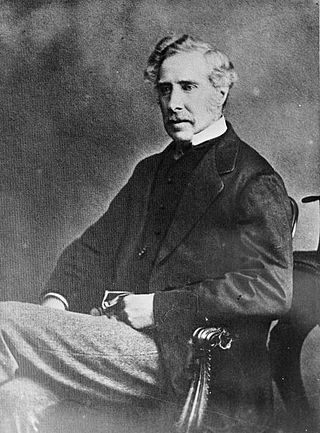| |||||||||||||
| |||||||||||||
| |||||||||||||
The 1891 Newton by-election was a by-election held on 31 March 1891 during the 11th New Zealand Parliament in the Auckland city electorate of Newton.
| |||||||||||||
| |||||||||||||
| |||||||||||||
The 1891 Newton by-election was a by-election held on 31 March 1891 during the 11th New Zealand Parliament in the Auckland city electorate of Newton.
The by-election was caused by the resignation of the incumbent MP David Goldie because of the demands of his business.
The by-election was won by Sir George Grey. He had retired from politics, but had accepted nomination for the vacancy provided he was not opposed, so was declared elected. [1] [2] [3]
He was in frail health, but had gone as a delegate to the Federation Convention in Australia. Another delegate, tired of Grey's numerous speeches inquired whether New Zealand intended to "come in". Grey replied Not at present, but we are interested in securing a Constitution which may tempt us to come in later on. [4]

Sir George Grey, KCB was a British soldier, explorer, colonial administrator and writer. He served in a succession of governing positions: Governor of South Australia, twice Governor of New Zealand, Governor of Cape Colony, and the 11th premier of New Zealand. He played a key role in the colonisation of New Zealand, and both the purchase and annexation of Māori land.

The 1890 New Zealand general election was one of New Zealand's most significant. It marked the beginning of party politics in New Zealand with the formation of the Liberal Government, which was to enact major welfare, labour and electoral reforms, including giving the vote to women.

The 1896 New Zealand general election was held on Wednesday, 4 December in the general electorates, and on Thursday, 19 December in the Māori electorates to elect a total of 74 MPs to the 13th session of the New Zealand Parliament. A total number of 337,024 (76.1%) voters turned out to vote.
Ashley was a New Zealand electorate situated north of Christchurch. It was in use from 1866 to 1902, and was replaced with the Hurunui electorate.
City of Auckland was a New Zealand electorate formed for the election of 1853. It covered the core of Auckland during the early days of New Zealand democracy, when the city was small enough to be covered by two or three seats. It existed from 1853 to 1860, and from 1890 to 1905.
Bay of Islands is a former New Zealand parliamentary electorate. It existed during various periods between 1853 and 1993. It was thus one of the original 24 electoral districts, and New Zealand's first ever MP was elected, although unopposed, in the Bay of Islands; Hugh Carleton thus liked to be called the Father of the House.
The former New Zealand parliamentary electorate on the western inner city of Auckland, was known as City of Auckland West from 1861 to 1890, and then Auckland West from 1905 to 1946.
Grey and Bell was a Taranaki electorate in the New Zealand Parliament from 1853 to 1881.
Thames is a former New Zealand electorate, in the Thames-Coromandel District. It existed from 1871 to 1946.
Newton was a 19th-century parliamentary electorate in Auckland, New Zealand. It existed from 1861 to 1893 and was represented by seven Members of Parliament.
Tuapeka is a former parliamentary electorate in the Otago region of New Zealand, from 1871 to 1911.
Wellington, was a parliamentary electorate in Wellington, New Zealand. It existed from 1853 to 1905 with a break in the 1880s. It was a multi-member electorate. The electorate was represented, over the years, by 24 members of parliament.
Christchurch was a parliamentary electorate in Christchurch, New Zealand. It existed three times. Originally it was the Town of Christchurch from 1853 to 1860. From the 1860–1861 election to the 1871 election, it existed as City of Christchurch. It then existed from the 1875–1876 election until the 1881 election. The last period was from the 1890 election to the 1905 election. Since the 1946 election, a similarly named electorate called Christchurch Central has been in existence.

David Goldie was the Mayor of Auckland City from 1898 to 1901 and a Member of Parliament in New Zealand. The artist C. F. Goldie was his son.

Thomas King was a 19th-century New Zealand politician. He served in the 1st and 2nd Parliaments, and was otherwise active in New Plymouth. He was one of the first settlers, coming out on the first ship to New Plymouth in 1841.

Seymour Thorne George was a New Zealand politician. The premier, Sir George Grey, was his wife's half-uncle and adoptive father, and that relationship resulted in Thorne George representing the South Island electorate of Hokitika despite him being based in the North Island. He later represented the Rodney electorate. Thorne George was later Mayor of Parnell.

James McCosh Clark was Mayor of Auckland City in the 1880s. He was a successful businessman until many of his ventures failed during the depression of the 1880s, causing him to return to England for the last decade of his life. He was the son of Archibald Clark.

The 13th New Zealand Parliament was a term of the New Zealand Parliament. It was elected at the 1896 general election in December of that year.

The 15th New Zealand Parliament was a term of the New Zealand Parliament. It was elected at the 1902 general election in November and December of that year.

This is a summary of the electoral history of Sir George Grey, Prime Minister of New Zealand, (1877–1879). He represented six electorates during his political career.